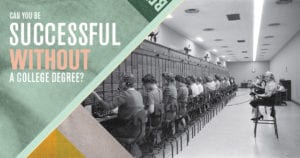Find your degree
Can You Be Successful Without a College Degree?
After decades of growth, total college enrollment is falling
Total US College Enrollment*
1947: 2.3 million (1.6%)
2011: 20.4 million (6.5%)
2016: 19.2 million (5.9%)
Is higher education still the best route to success?
Redefining Success
78% of adults agree that it’s getting harder for young people to “get started in life”
According to young adults, the biggest obstacles they face are:
Finances: 37%
Education: 25%
Career: 20%
Nearly half of Gen Zers consider financial independence the first marker of adulthood
Does Education Bring Financial Success?
For nearly all careers, wages have risen over the past 70 years
Skilled laborers, without a degree, are making more than 3x more today
BUT, for careers requiring an advanced degree, wages have less than doubled
Annual Earnings, 1947*-2017
Construction
1947: $13,186
2017: $44,730
Telecommunications
1947: $12,036
2017: $53,380
Lawyer
1947: $84,000
2017: $119,250
Doctor
1947: $121,148
2017: $208,000
At the same time, the cost of an advanced degree has grown more than 8x,
Law School Tuition*, 1948-2018
1948-1949: $3,338*
2018-2019: $26,864*
For many, milestones on the road to success are getting harder to achieve
Rethinking the American Dream
Starting a Family
Most American adults* define themselves by their family
American families are getting smaller
Average family size
1948: 3.64 people
2017: 2.14 people
People are having fewer children
Children* per family
1948: 1.19 children
2017: 0.88 children
Fewer American adults are getting married
Households including married couple
1948: 79%
2017: 48%
Many adults are choosing to live with friends instead of family
Non-family households
1948: 10%
2017: 34%
The Ideal American Luxuries
With more Americans living alone, everyday luxuries are harder to afford
Most Americans want more:
Vacation time
Technology
Restaurant dinners
Owning A Home
In 1940, the average home cost $2,938 一 That’s equal to $52,976 today
Rent, on average, cost $27 一 Or $487 today
Since then, housing prices have soared
Today, the median home value is $220,100 一 4x the typical home in 1940
Rent has risen to $1,650 一 More than 3x what it once was
As rent continues to skyrocket, apartments are getting smaller 一 8% smaller over the last decade
The Ideal American Home:
To feel successful, Americans want a house 2x as valuable as their current home
On average, Americans want
4 bedrooms
3 bathrooms
$408,584 value
Rising tuition costs and mounting student debt have prompted more Americans to consider other options
Reconsidering College
Servicemen’s Readjustment Act of 1944 (The G.I. Bill)
Covered tuition and expenses totaling over $4 billion dollars
From 1944-49, allowed 9 million veterans to attend college or trade school
Over the past 70 years, Undergraduate tuition* has grown more than 4x
Annual undergraduate tuition and fees 一 University of North Carolina at Chapel Hill
1948-1949: $1,092*
2018-2019: $4,493
Today, young adults who want an education need student loans
2 in 3 who get a bachelor’s degree go into debt
Less than half of those getting a non-degree certificate go into debt
In 2018, Americans’ total student debt hit $1.5 trillion
Embracing Alternatives
In 1945-46 just 156,000 Americans attended 2 year college programs
In 2016,
5.28 million attended 2-year colleges
939,000 received a non-degree certificate
999,000 received an associate’s degree
In 2017, 88% of new grads say they considered job availability before selecting their major 一 Yet, 54% consider themselves underemployed
College or Career?
Choosing a Major
Nurses and Engineers are most likely to earn high wages and see low unemployment
Below-average unemployment
Nursing, general education, mechanical engineering
Above-average earnings
STEM fields, nursing, economics, accounting, political science
From 1946 to 2017, wages for engineers grew over 14.5x ─ From $5,457* to $79,180
In 2016, only 6% of newly awarded Bachelor’s degrees were in engineering
Fast Growing Non-Degree Careers, Median Salary $35,000 to $54,999
Many of today’s fastest growing careers don’t require a degree at all:
Optician
Plumber
Dental assistant
HVAC technician
Alternative energy technician
Learn from history! Consider the job market before choosing college or a career
Sources:
https://factfinder.census.gov/faces/tableservices/jsf/pages/productview.xhtml?pid=PEP_2017_PEPANNRES&src=pt
https://heartlandmonitor.com/how-younger-americans-are-redefining-success/
https://www.barna.com/research/is-gen-z-the-most-success-oriented-generation/
https://babel.hathitrust.org/cgi/pt?id=uiug.30112104053548;view=2up;seq=4;size=125
https://www.bls.gov/ooh/home.htm
https://babel.hathitrust.org/cgi/pt?id=uc1.b4088194;view=2up;seq=234
https://www.zillow.com/home-values/
https://www.rentcafe.com/blog/rental-market/us-average-apartment-size-trends-downward/
https://www.history.com/topics/world-war-ii/gi-bill
https://cashier.unc.edu/files/2018/07/18_19YR.pdf
https://www.federalreserve.gov/publications/2018-economic-well-being-of-us-households-in-2017-student-loans.htm
https://www.federalreserve.gov/releases/g19/HIST/cc_hist_memo_levels.html
https://nces.ed.gov/pubs93/93442.pdf
https://nces.ed.gov/fastfacts/display.asp?id=51
https://nces.ed.gov/programs/coe/indicator_sbc.asp
https://www.bls.gov/ooh/occupation-finder.htm


